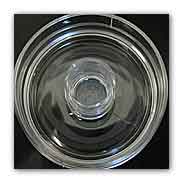|
Weak concentrations of bisphenol A are sufficient to
produce a negative reaction on the human testicle.
This has just been shown experimentally for the
first time by René Habert and his colleagues (UMR
Cellules souches et Radiations [UMR Stem Cells and
Radiation], Inserm U 967 - CEA - Paris Diderot
University) in an article that appeared in the
journal entitled Plos One.

System for culturing fœtal testicles developed by René Habert’s team. © R. Habert/inserm
Bisphenol A (BPA) is a chemical compound that is
included in the composition of plastics and resins.
It is used, for example, in the manufacture of food
containers such as bottles and babies’ feeding
bottles.
It is also found in the protective films used inside
food and drink cans and on till receipts where it
used as a discloser. Significant levels of BPA have
also been found in human blood, urine, amniotic
fluid and placentas. Recent studies have shown that
this industrial component has harmful effects on
reproductive ability, development and the metabolism
of laboratory animals. BPA is strongly suspected of
having the same effects on humans.
As a precautionary measure, the manufacture and sale
of babies’ feeding bottles containing bisphenol A
have been banned in Europe since January 2011. This
ban will be extended in France to all food
containers from July 2015. It will also be important
to ensure that in the future, bisphenol A is not
replaced by substitutes that have the same action.
In an article published in Plos One, René Habert and
his colleagues provide the first experimental proof
that weak concentrations of bisphenol A are
sufficient to produce a negative reaction on the
human testicle. No experimental study has shown
hitherto that bisphenol A has a deleterious effect
on male human reproduction and the few
epidemiological studies that exist remain
contradictory.
In collaboration with the Antoine-Béclère Hospital,
Clamart (1), researchers kept petri dishes of human
fœtal testicles alive in the presence of bisphenol A
or in the absence thereof, using an original
procedure developed by this team. In 2009, this
procedure made it possible to show for the first
time, that phtalates (a different category of
endocrine disruptors (2) that are found in PVC,
plastics, synthetic materials, sprays, etc.) inhibit
the development of future spermatozoa in the human
fœtus.
In this new study, researchers observed that
exposure of human fœtal testicles to bisphenol A
reduces the production of testosterone, and of
another testicular hormone that is necessary for the
testicles to descend into the sacs in the course of
fœtal development. A concentration equal to 2
micrograms per litre of bisphenol A in the culture
medium was sufficient to produce these effects. This
concentration is equal to the average concentration
generally found in the blood, urine and amniotic
fluid of the population.
Testosterone is known to be produced by the testicle
during the life of the fœtus, imposing
masculinisation of the internal and external
genitals which, in the absence of testosterone,
develops spontaneously in the female direction.
Furthermore, it is likely that testosterone also
plays a role in the development of the testicle
itself.
Consequently, the current exposure of pregnant women
to bisphenol A may be one of the causes of
congenital masculinisation defects (of the
hypospadia and cryptorchidism types) the frequency
of which has doubled overall in the past 40 years.
According to René Habert, “it is also possible that
bisphenol A contributes to a reduction in the
production of sperm and the increase in the
incidence of testicular cancer in adults that have
been observed in recent decades”.
Furthermore, researchers have compared the response
to bisphenol A in human fœtal testicles to those in
the fœtal testicles of rats and mice. “We have
observed that the human species is far more
sensitive to bisphenol A than the rat and the mouse.
These results should encourage greater caution in
regulatory toxicology in the extrapolation of data
obtained on animals to define tolerable exposure
thresholds in human health”, explains René Habert.
Finally, the researchers show in this article that
Bisphenol A acts through a mechanism that is
non-standard and that remains unknown but that it is
important to identify in order to better understand
the action of endocrine disruptors.
System for culturing fœtal testicles developed by
René Habert’s team. The testicles are sliced into
tiny fragments then deposited on a filter in the
centre of a petri dish. In an appropriate atmosphere,
they are able to survive thus for several days,
while secreting testosterone.
Footnotes:
(1) Gynæcology, Obstetrics and Reproductive Medicine
Department
(2) Substance or mixture not produced by the body
that alters the functioning of the hormonal system,
thus introducing harmful effects on the health of an
intact organism, its descendants or sub-populations
For more information
Differential Effects of Bisphenol A and
Diethylstilbestrol on Human, Rat and Mouse Fetal
Leydig Cell Function
http://www.plosone.org/article/info:doi/10.1371/journal.pone.0051579
(MDN)
|